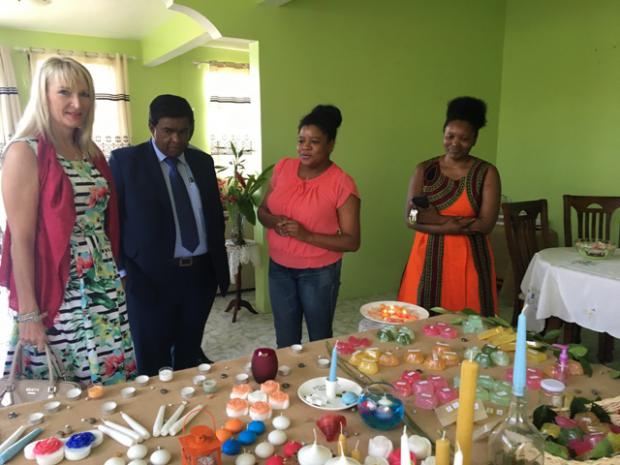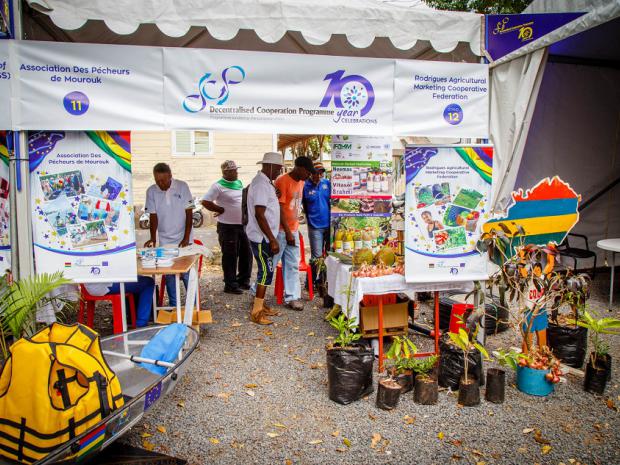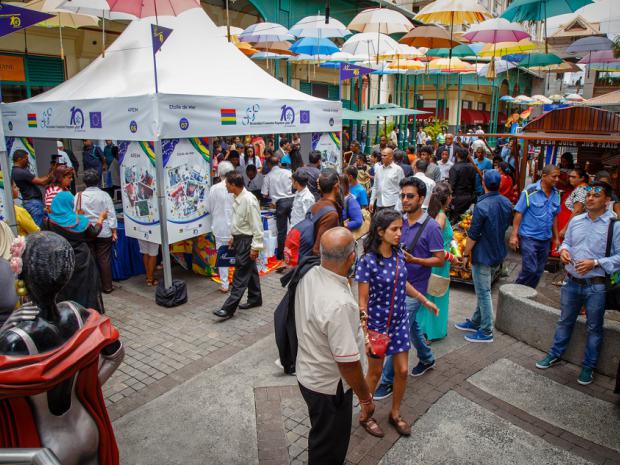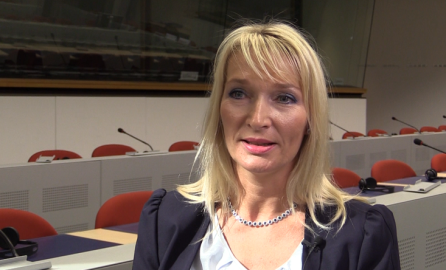EU Ambassador Marjaana Sall shares her experience of managing a changing relationship with Comoros, Mauritius and Seychelles, as the latter two graduate to middle and higher income status. She emphasises the importance of working together on issues including climate change and trade, and shares examples of successful EU-funded projects.
| Marjaana Sall began her four-year term as EU Ambassador to Mauritius in September 2015, following experience in the EU Delegation to Kenya and the Finnish Missions to the UN, Indonesia and South Africa. |
Capacity4dev (C4D): What is the scope of your Delegation’s work, and what are the main challenges?
Marjaana Sall (MS): One challenge is the diversity - Seychelles, Mauritius and Comoros are all Small Island Developing States (SIDS) with particular vulnerabilities linked to that, but they’re all very different. Mauritius is a middle income country, Seychelles is a high income country, and Comoros is a least developed, fragile country.
Linked to that is that obviously the bilateral programmes with Mauritius and Seychelles have decreased because of the EU’s differentiation policy; it means the current NIP [budget of the National Indicative Plan] is much less than it used to be. [Seychelles will receive €2.2 million from 2014-20, compared to around €20 million in 2008-13, and Mauritius will receive €9.9 million in this funding cycle, compared to €317 million previously. Comoros will receive around €68 million in 2014-20.] The Delegation is also responsible for relations with the Indian Ocean Commission (IOC), a regional organisation.
The challenge is how to manage this change with the countries, how not to lose influence because of decreasing funds, while finding other ways of partnering in areas where we have mutual interests and shared values.
We have allocated €1.3 billion under the 11th European Development Fund to the Eastern Africa, Southern Africa and Indian Ocean region until 2020. Out of this envelope, €50 million is allocated to the IOC. This means that most of the operational staff deal with regional issues. This obviously brings about another challenge for the Delegation. We need to be able to work with bilateral as well as regional issues which are increasingly becoming important for our Delegation.
C4D: How are you managing that change? What will be the main areas of partnership?
MS: There are various other instruments you can explore with the governments on aid and cooperation. One key area we want to work together on is climate change. The islands are vulnerable and they face many challenges. They are also our allies in many global issues such as climate change negotiations. A good example of this was the agreement between the EU and the Indian Ocean Commission ministers on climate change ahead of the COP21 [UN climate change summit] in Paris; it increased the visibility of SIDs with regards to climate change.
Mauritius is profiling itself on international fora – they hosted the African ministerial meeting on climate change and ocean economy and governance in September, with the aim of providing African inputs before the COP meeting in Marrakesh. In June, the President hosted a high level forum on climate change and women, with hundreds of participants from all over the globe. Mauritius also hosts the Commonwealth Climate Finance Access Hub. We can accompany and support them in these global challenges.
C4D: Could you share any EU-funded climate change projects in your Delegation which have had an impact?
MS: For a number of years we have supported Seychelles, Mauritius and Comoros through the Global Climate Change Alliance (GCCA+) programmes, and we continue to do so. These focus on climate change mitigation and adaptation, and support the countries in implementing their INDCs (Intended Nationally Determined Contribution) to reduce greenhouse gas emissions and to improve the capacity of vulnerable groups to adapt to the impact of climate change.

In Seychelles, for instance, under the GCCA+ programme, we are addressing recurrent flooding problems on the island of La Digue, by assisting in the preparation of a shoreline management plan and with the construction of drains to evacuate the water that accumulates during heavy and frequent rainfalls.
In addition, SWITCH Africa Green (SAG) has various projects in Mauritius – it is one of the six countries benefitting from the programme. They deal with eco businesses, how to support sustainable consumption and production patterns among small and medium sized business operators – including in the tourism sector in Mauritius. For more on SWITCH, see our recent Voices & Views.
A recent outcome of the Switch Africa Green project is the 2016 SAG SEED award for eco innovation granted to Belle Verte, a Mauritian social enterprise involved in the collection and sorting of waste which is then recycled.
C4D: How is the EU supporting the islands on trade, and leveraging trade to support development?
MS: Mauritius used to be a monocrop industry, exporting principally sugar in the 1970s. Since the mid-2000s Mauritius has received a lot of support from the EU to reform its sugar sector, and I think by and large they have reformed it quite well and benefited from our support to diversify the economy generally. The sugar sector used only to produce raw sugar but since 2009 there have been refineries and the country now exports refined white sugar. Flexi-factories have also been set up whereby biofuels like ethanol are produced, as well as special sugars. The economy has in general become diversified and more competitive. Mauritius is now a well-known exporter of textiles, fish and manufactured goods, principally destined for the EU market.
So in a way Mauritius is a good case study where through EU support to ACP countries, the country has managed to increase growth and carry out structural reforms to the benefit of the country and the people. The EU has a good image there. They know that the EU is a good partner, and it’s this partnership we now need to deepen.
Next Steps
The EU is an important market for Seychelles and Mauritius - in fact we are their biggest trading partner. Both Seychelles and Mauritius have signed an interim EPA [Economic Partnership Agreement] with the EU [providing duty- and quota-free access to the EU market, and gradually opening local markets to European exports]. We hope to see Comoros signing soon, and negotiations are at latter stage. We have a regional DG Trade post in the Delegation supporting trade cooperation.
Mauritius and Seychelles also benefit from regional funds to deepen their regional integration strategy with COMESA [the Common Market for Eastern and Southern Africa] and SADC [the Southern African Development Community] by domesticating regional commitments. A programme of capacity building is in the pipeline for implementation of the EPA for both Mauritius and Seychelles. In the case of Mauritius the focus would be on improving the business and investment climate while in Seychelles the thrust would be on developing an enabling environment for SMEs as well as enhancing trade facilitation and improving market access.
The EU is providing support through capacity building to the Mauritius Standards Bureau and Seychelles Bureau of Standards to address technical barriers to trade. Support is also being provided to improve risk management and implementation of a single window at the Mauritius and Seychelles Customs. [A single window simplifies import, export and transit-related regulatory requirements when trading or transporting goods across borders. Benefits can include automated cargo release and being able to submit data in advance and electronically. For more information, visit the World Customs Organisation.]
C4D: Is there a project which has worked well which could be replicated elsewhere?
MS: I was happy to see during my first year how the Decentralized Cooperation Programme (DCP) has

contributed to improving livelihoods of the most vulnerable. I have seen a significant improvement in the capacity of local Civil Society Organisations (CSOs) to deliver their services to the most vulnerable groups. They are also better equipped to bid for funds from local and international sources. They can advocate more effectively for the cause of the neediest segments of society. I am pleased that the Non-State Actors Capacity Building Programme of the DCP has contributed to this evolution by empowering CSOs in the areas of governance, management, advocacy and political dialogue, monitoring & evaluation and organisational development. This year marks the 10th anniversary of the Decentralised Cooperation Programme (DCP) in Mauritius and Rodrigues, and provides an opportunity to demonstrate the achievements of civil society for the development of the country.
Under the DCP we have provided support to the Association Mauricienne des Femmes Chefs d'Entreprise (Mauritian Association of Women Entrepreneurs) for a project titled "Autonomisation des femmes pour un mode de vie sain et productif" (Empowering women for healthy and productive lifestyles). The project has, among others, contributed to the training of more than 400 women in the field of health; nutrition knowledge; developing skills in entrepreneurship; and safety. 50 women were coached to become independent and generate income to support their families.
The DCP will end quite soon as this facility will not be provided under the 11th EDF. It has given us great visibility, as we join various Ministers when launching ceremonies of final workshops.
C4D: How does the Delegation work with EU Member States and other donors?
MS: We have Joint Programming with France in Comoros, and it’s been a good step forward.
Based on an extensive consultation process, the priority sectors identified for the 11th EDF are: i) sustainable development of road and port infrastructure, ii) technical and vocational training and iii) governance including support to justice sector and public finance management reforms and strengthening of the electoral process. The 11th EDF initial indicative allocation amounts to €68 million.
With the joint EU-France cooperation strategy, Comoros is among the first of the African, Caribbean and Pacific countries to have managed a joint programming exercise. Both France and the EU have aligned their programming exercise to the priorities and period of the new strategy for accelerated growth and sustainable development of Comoros (SCA2D, 2015-19) and coordinated their respective support programmes, for more effective cooperation in accordance with the Paris Declaration on aid effectiveness.
In Mauritius and Seychelles, the UK and France are present. They don’t have bilateral aid programmes (grants) anymore, but we have a close cooperation with them. We also meet regularly with colleagues from the UN family and other donors.
We have a close working relationship with the EU Delegation in Madagascar, which is the only other EU Delegation in the Indian Ocean islands, and EU Delegations based in the coastal states of Eastern and Southern Africa. We share information and meet on a regular basis in the context of regional cooperation programmes.

Our Delegation ensures the coordination among several EU Delegations covered by the IMF Technical Assistance Centre, AFRITAC South, which is based in Mauritius. We share information including work programmes and reports. This has improved the coordination process. A shared challenge is to ascertain that AFRITAC South interventions in each country are complementary to EU support.
We have longstanding relations with Mauritius, Comoros and Seychelles. We have already started discussions with their governments regarding the future of our relations after 2020 (Post Cotonou), in order to shape a partnership based on issues of common interest, which brings sustainable development for all.
Further reading


Log in with your EU Login account to post or comment on the platform.